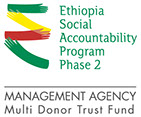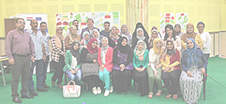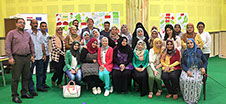The programme’s website contains a lot more information, including Newsletters, testimonies, most significant change stories, etc. Furthermore, a YouTube channel with many audio visuals can be found here.

‘LACEP has managed to create the conditions for stakeholders to start influencing the reality of their communities and, in doing so, transform their self-perceptions’
‘The project had contributed to build alliances and transcend long-standing divides between social actors and institutional actors’
From: ‘Mid-Term Impact Assessment’ of the EU-funded project ‘Local Authorities Capacity Enhancement Project (LACEP)’ in Zimbabwe (2015-2017)
VNG International Annual Update 2017
5 Enhancing Local Government Legitimacy
Worldwide, the relationship between citizens and their authorities is becoming more and more an issue. This is the case in countries with a long history of representative democracy, in countries with a more centralistic government, and in countries which are in transition from a more centralistic, closed system to a more open and participative governance approach. Since its establishment in 1993, VNG International has built a strong track record in supporting the transformation to new governance structures and the corresponding change in political culture. Also now, several large and successful programmes and some recently started and promising projects are in execution.
A common experience from the ongoing projects and programmes, in Egypt, Ethiopia, Georgia, Myanmar, South Sudan and Zimbabwe, is that change is needed on both sides: local governments as well as civil society organisations. Change in terms of understanding one’s own role and the perception of the roles of the other, change in attitude towards each other, and change in terms of skills development. It is rewarding to see that we can really make a difference by bringing people around the table, helping them create understanding and build trust; by providing the tools to start new forms of cooperation; and by training people to use those tools. It has proven to be a great advantage if in combination with the capacity building activities a small grants scheme is available, allowing people to bring newly acquired insights and skills into practice.
One of our largest projects, and very successful, is in Ethiopia, where we lead the Management Agency for the Ethiopia Social Accountability Program Phase 2 (ESAP2) (2011-2017), initiated by the Government of Ethiopia (GoE)and financed through a World Bank managed multi-donor trust fund. We capacitate a range of CSOs in their role of holding local governments in 223 districts of the country, which is a 25% coverage, accountable for the investments done in basic social services (e.g. 153 additional class rooms built, 269 additional qualified teachers recruited, 67 separate toilets for girls & boys built). We provide training and guidance to stakeholders and use five social accountability tools (citizen report cards, community score cards, gender responsible budgeting, participatory planning & budgeting and public expenditure tracking mechanism) to ultimately improve the quality of basic services at local level. The impact of the ESAP2 intervention has been that 345.000 Ethiopian citizens are able to hold their service providers accountable.
The focus in the EU-funded ‘Support to Public Administration Reform and Local Development (PARLOD)’ project in Egypt (2015-2018), which we implement together with the French Ecole Nationale d’Administration, is more on the government side, and more specifically on improving services to citizens. Our support includes a.o. contributing to the development of service standards of three pilot services (issuing building permits, establishment of an incident management system, and Civil Status Organization services) by reengineering workflows and organisational procedures in 8 pilot local level service centres of the Ministry of Local Development. Processes in these service centres are reported to be more efficient now. Since change always requires development at organisational and individual level, we also trained 150 senior and junior managers of local level service centres in the three pilot governorates of Minia, Monofeya and Ismailia.
In Myanmar we manage the ‘National Community Driven Development Project’ (2015-2020), assigned to us by the Government of Myanmar, and financed by the World Bank. The challenge here is to use the relatively small grants for projects at township level in such a way that they become a boost for development. And that they function at the same time, through the way the projects are selected and the way accountability is organised, as a means to promote democratisation.
In the project ‘Civil Society Fund South Sudan’ (2016-2020), together with lead partner Ecorys, we aim to strengthen civil society organisations, equip them to deepen linkages with citizens and build constituencies, to let them work together at county, state and national level, and to let CSOs and government work together in demand-led dialogues. While the operating space of civil society in South Sudan is limited the project seeks to support CSOs in bringing about positive change in the lives of poor and marginalised people. This is done through a variety of mechanisms (capacity building, mentoring, implementation of voice and accountability initiatives, peer learning and exchange) available through a competitive fund arrangement.
The EU-funded ‘Local Authorities Capacity Enhancement Project (LACEP)’ project in Zimbabwe (2015-2017) connects service improvement at the municipal level with enhanced citizens-local governments relations, as is well expressed in the significant change story from the Mid-Term Impact Assessment following hereafter.
....................................................
The management of solid waste in Bikita had been an outstanding problem for many years, with citizens’ organizations and the local authority entrenched on opposite sides of a cleavage fueled by mistrust, alienation and lack of engagement.
The Participatory Policy Making workshop in Gweru offered an opportunity to transcend the situation. During the workshop representatives from both, the local authority in Bikita and the residents’ associations began to work together and to develop a better understanding of the various roles and limitations of the different stakeholders. The workshop created the minimum conditions of trust and provided the necessary tools so that when they were back in Bikita, they would be able to sit together and start addressing jointly the challenges of solid waste management. They actually did it! The Local authority started working with residents’ associations, associations of local entrepreneurs, NGOs, but also with the Environmental Agency and the Ministry of Health in order to revamp collectively the solid waste management policy in Bikita. Today, Bikita is much cleaner than it has been for years; citizens and institutions have created a sense of shared responsibility over the management of local affairs, which translates in effective engagement mechanisms and cooperation. This new way of doing things, is allowing the community to improve progressively the management of waste. Most importantly it has set a new blueprint as to how effective local democratic governance looks like, which will definitely have a substantive impact in the management of other policy areas.
From: ‘Mid-Term Impact Assessment’ of the EU-funded project ‘Local Authorities Capacity Enhancement Project (LACEP)’ in Zimbabwe (2015-2017)
With the City of Rustavi, Georgia in the lead, and together with our daughter company MEPCO, we support the introduction of a participatory budgeting approach in Rustavi (2016-2018). Existing citizens’ services centres in Rustavi are used to collect feedback on local issues which provide input for the budgeting process, and introduce the concept of participative budgeting to citizens. Civil servants receive training, dialogue between the municipal leadership/staff and CSOs/public groups is promoted, and the mechanisms for participatory budgeting are institutionalised. The long-term strategy has been finalised, while a short-term action plan – also developed with our support – will be used for the first year. This two-step approach is used to create an environment in which the civil servants of Rustavi can immediately use the knowledge and skills they gained in the trainings, and thus create quickly visible first project results.
Policy development and exchange of experience
Our experts actively participate in the Knowledge Platform of the Global Partnership for Social Accountability (GPSA). In May 2016, one of them, together with representatives of the Ethiopian Ministry of Finance and Economic Development, the World Bank, and one of the CSO implementers, participated in the GPSA Global Partners Forum in Washington, where they shared the experiences of ESAP-2




